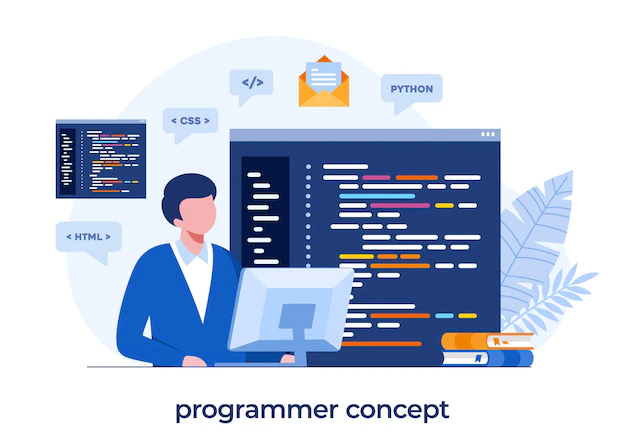
Programmer: 3 Types of Projects That Make You One
In the world of programming, the saying "practice makes perfect" holds. As a programmer, it is crucial to continually work on projects to enhance your skills and expand your knowledge. While any programming project can help you grow as a programmer, three specific types of projects can have a significant impact on your development. Let's take a closer look at these projects and how they can make you a better programmer.
From Beginner to Expert: The 3 Project Types Every Programmer Should Tackle

Have you just started your coding journey and are wondering what projects to work on to level up your programming skills? Look no further! In this article, we will explore the three types of projects that every programmer should tackle on their path from beginner to expert.
1. Simple Console Applications: Building simple console applications is a great starting point for beginners. It allows you to focus on mastering the basics of programming logic and syntax without getting overwhelmed by complex user interfaces or external libraries. Start with simple programs like a calculator, a to-do list manager, or a text-based game. These projects will help you understand variables, conditionals, loops, and basic input-output operations. As you gain confidence, you can gradually increase the complexity of your console applications.
2. Web Development Projects: In today's digital age, having a strong foundation in web development is essential for any programmer. Start by learning HTML, CSS, and JavaScript, the three fundamental technologies for building websites. Once you are comfortable with the basics, challenge yourself by creating a personal portfolio website or a blog. This will give you hands-on experience in working with front-end technologies. As you progress, you can dive into backend development using popular frameworks like Node.js or Django. Building web applications will introduce you to concepts such as databases, user authentication, and server-side programming.
3. Collaborative Open-Source Projects: Once you have developed a solid understanding of programming concepts and gained experience with personal projects, it's time to take your skills to the next level by contributing to open-source projects. Open-source projects are software projects that are publicly accessible, and anyone can contribute to their development. They provide an excellent opportunity to work with experienced programmers, learn from their expertise, and collaborate with a global community. Start by finding projects that align with your interests and skills. It could be fixing bugs, adding new features, or improving documentation. Contributing to open-source projects not only enhances your technical skills but also allows you to build a professional network and showcase your work to potential employers.
Remember to approach these projects with a growth mindset. Don't be discouraged by challenges or setbacks. Learning programming is a continuous journey that requires patience and dedication. Embrace the learning process, seek out resources, and don't hesitate to ask for help when needed. The more projects you tackle, the more confident and skilled you will become as a programmer. So, start coding and embark on your path from beginner to expert!
7 Exciting Project Ideas That Will Turn You Into a Pro Programmer

Do you have a passion for coding and want to take your programming skills to the next level? Look no further! We've compiled a list of seven exciting project ideas that will help you become a pro programmer. So, get your coding gears ready and let's dive in!
1. Build a Personal Website
Creating your personal website is not only a great way to showcase your skills but also a valuable project that allows you to practice HTML, CSS, and JavaScript. You can include your resume, portfolio, and even a blog to demonstrate your expertise and attract potential employers or clients.
2. Develop a Mobile App
With mobile devices becoming an integral part of our lives, learning how to develop mobile apps will skyrocket your programming career. Choose a platform, such as iOS or Android, and dive into app development using languages like Swift or Java. Create a useful or entertaining app that caters to a specific target audience, and be amazed by the skills you acquire along the way.
3. Design a Video Game
If you're a gaming enthusiast, why not channel that passion into developing your very own video game? By utilizing game development frameworks like Unity or Unreal Engine, you can create stunning graphics, engaging gameplay mechanics, and even incorporate multiplayer features. Gather your friends, test your creation, and experience the thrill of bringing a virtual world to life.
4. Automate a Tedious Task
Programming is all about solving problems, and what better way to showcase your problem-solving skills than by automating a mundane task? Identify a repetitive task in your daily life or work, and develop a script or program that automates it. Whether it's organizing files, extracting data from websites, or generating detailed reports, automating these processes will not only save you time but also demonstrate your ability to streamline workflows.
5. Build a Chatbot
In the age of artificial intelligence, creating a chatbot can be an exciting and engaging project. Utilize natural language processing tools like Dialogflow or Rasa to design a chatbot that can interact intelligently with users. Add functionalities like answering frequently asked questions or guiding users through a process. This project will help you understand machine learning principles and enhance your problem-solving abilities.
6. Create a Data Visualization Tool
Data is everywhere, and being able to analyze and present it effectively is a valuable skill in the programming world. By developing a data visualization tool, you can showcase your expertise in manipulating and representing data visually. Use libraries like D3.js or matplotlib to create interactive and informative charts, graphs, or maps that bring complex data sets to life.
7. Contribute to Open Source Projects
Contributing to open-source projects is an excellent way to collaborate with other programmers, gain real-world experience, and improve your coding skills. Start by finding an open-source project that aligns with your interests and skillset. Whether it's fixing bugs, adding new features, or writing documentation, your contributions will not only be appreciated but will also help you understand complex codebases and learn from experienced developers.